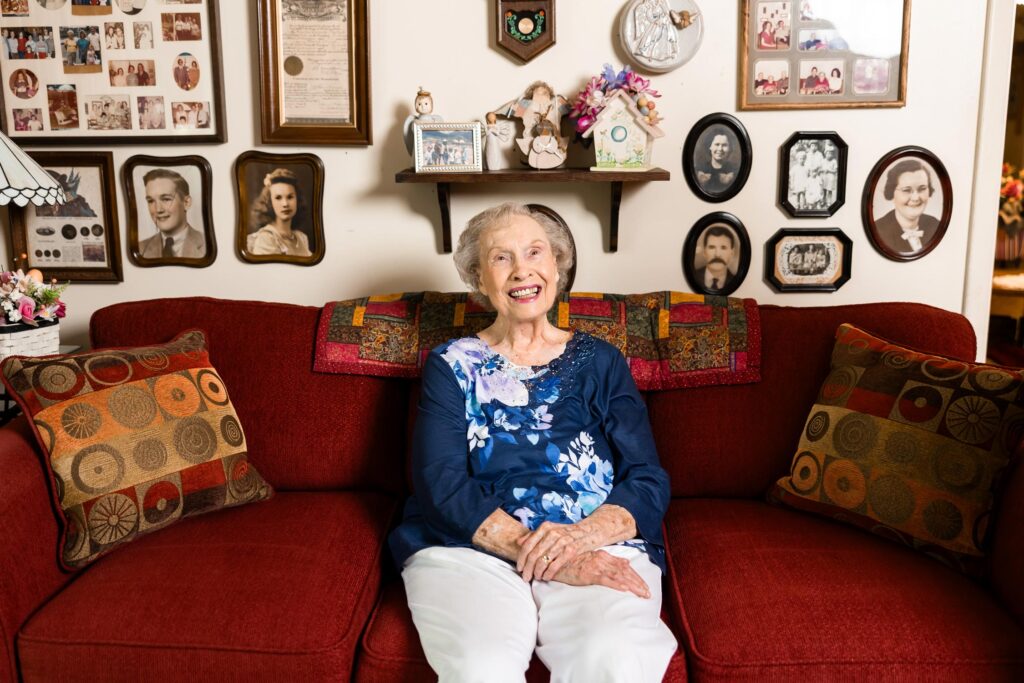
Each phase of life presents unique challenges, and the senior years are no different. As such, many families grapple with a critical decision: should they hire a caregiver for their aging parents, or is an assisted living facility a better choice?
Either of these two options comes with its own set of advantages and challenges, and the best choice varies based on individual circumstances.
At CareLink, we are dedicated to supporting older individuals and their families by providing essential resources to navigate the complexities of aging.
As you contemplate the future care of your aging parent or loved one, here are some considerations and helpful tips for approaching this crucial conversation.
Understanding the Basics
Both in-home caregiving and assisted living facilities play crucial roles in supporting the elderly. At the same time, they cater to different needs and preferences, with varying levels of care and independence to enhance your aging parent’s quality of life.
In-home Caregiving
According to the American Association of Retired Persons (AARP), a significant 90% of adults over 65 years old express a preference to age in the comfort of their own homes.
In-home caregiving focuses on supporting seniors to live independently in their homes for as long as they wish. This type of aged care support is customized through comprehensive plans developed by a licensed RN or qualified supervisor, in collaboration with the senior, their family, and healthcare providers.
In-home care services are delivered by thoroughly vetted caregivers who assist with a range of tasks from personal hygiene and meal preparation to transportation and social activities.
CareLink As An Established Aged Care Provider
Since 1979, CareLink has stood as a pillar of senior services in Central Arkansas, committed to maintaining high standards of support for homebound seniors.
As a licensed Class B home health agency, we dedicate ourselves to delivering hands-on, high-quality care that enables Aging Arkansans to continue living independently in their own homes.
At CareLink, each senior receives a customized care plan that’s designed to meet their unique personal and financial needs. Once a care plan is in place, trained home care attendants step in to provide a wide array of services, including:
- Personal hygiene
- Housekeeping
- Shopping assistance
- Transportation services
- Meal preparation
- Pet care
- Medication management
- Assistance with dressing
- Laundry
- Social interaction
Assisted Living Facilities
On the other hand, assisted living communities generally provide a residential-like environment with private apartments or rooms. These facilities provide services that are similar to in-home caregiving, such as prepared meals, housekeeping, and medication management, along with help performing activities of daily living (ADLs) like bathing and dressing.
The level of care available can vary widely as it is regulated at the state level, meaning the specific services offered can differ from one location to another.
About 2% of U.S. seniors reside in assisted living facilities. In Arkansas, the average cost of assisted living is around $4,500 per month.
Benefits of Hiring a Caregiver for Aging Parents
1. Familiar Home Setting
The ability to remain in one’s own home can significantly enhance emotional well-being and overall quality of life. In-home caregivers allow individuals to stay in their familiar surroundings, surrounded by their cherished memories. This helps mitigate the stress and upheaval often associated with moving to new living environments, fostering a sense of stability and comfort.
2. Tailored Care and Dedicated Attention
One significant benefit of employing a private in-home caregiver for aging parents is the personalized care and focused attention they deliver. Unlike the more generic care provided in assisted living or nursing facilities, a private caregiver designs care plans specifically for the individual's unique requirements, enhancing both comfort and independence.
3. Emotional Companionship and Support
According to the World Health Organization, social isolation and loneliness impact roughly a quarter of older adults and are significant risk factors for mental health issues later in life. Caregivers for aging parents do more than attend to physical needs—they also offer vital companionship and emotional support. This aspect of care is particularly important for seniors and individuals with chronic illnesses who may experience loneliness and isolation.
4. Dedicated Personal Support
The one-on-one support offered by private caregivers ensures a level of care that is not always possible in institutional settings. This focused attention allows caregivers to respond swiftly to the needs of their clients and develop a deeper understanding of their health and personal requirements over time. Support from caregiving agencies further enhances this personalized service.
5. Adjustable Care Schedules
An in-home caregiver for aging parents provides flexible care options that can be customized to fit the unique schedules and needs of each client and their family. From part-time help to 24/7 care, the scheduling flexibility offered by caregivers makes it easier for families to manage their caregiving responsibilities alongside other commitments.
Benefits of Assisted Living Facilities
1. Engaging in Activities and Social Events
Assisted living facilities offer many activities that cater to diverse interests, ensuring that seniors have ample opportunities to engage and socialize. These facilities frequently host events like movie nights, provide communal gardens for gardening enthusiasts, and offer classes in art and music to foster creativity.
Seniors can also enjoy organized group outings that add excitement to their daily lives. These outings may include trips to local museums, shopping centers, religious services, and various seasonal festivals.
2. Promoting an Active Lifestyle
Physical activity is crucial for the well-being of seniors, and assisted living facilities make it easy for residents to stay active without the logistical challenges of arranging transportation. These facilities offer a range of fitness classes that are highly curated to the different skill levels and physical abilities of seniors.
3. Maintenance-Free Living
One of the most significant advantages of assisted living is the maintenance-free lifestyle it offers. Residents are relieved from the burdens of daily chores and home maintenance, as these facilities provide comprehensive services including housekeeping, laundry, and meal preparation.
4. Nutritious Food
Nutrition is one of the most important factors for our aging parents to thrive in their golden years. But according to the USDA, around 7 million seniors were food insecure in 2022.
Assisted living facilities prioritize the nutritional needs of seniors by providing well-balanced, healthy meals prepared by professional chefs and dietitians. Most of the time, meals are served in a restaurant-style setting. Accommodations are also made for various dietary needs, including low-sodium, diabetic, and cholesterol-conscious diets.
5. Enhanced Safety Features
Safety is a paramount concern in assisted living facilities, which are designed to minimize risks such as falls. These facilities are equipped with safety features like flat thresholds, ramps, and grab bars in bathrooms to ensure a safe environment for seniors. Additionally, emergency call buttons in each apartment allow residents to quickly contact staff in case of an emergency.
Factors to Consider When Choosing In-Home Caregiving vs Assisted Living Facility
Choosing the right care option for a senior can be a complex decision influenced by several key factors. But when doing so, it’s important to involve the senior in the decision-making process to ensure their comfort and satisfaction with the chosen care arrangement.
Here’s an overview of considerations that can help in deciding whether in-home care or an assisted living facility is more suitable for your loved one.
1. Level of Care Needed
In-home care is best for seniors who require minimal to moderate assistance with daily living activities or those who prefer a more personal, one-on-one care setting.
Assisted living facilities, on the other hand, are generally better suited for seniors who require a higher level of care and supervision. These facilities provide a structured environment where care is readily available 24 hours a day. The staff in assisted living facilities are trained to handle a wide range of medical and personal care needs and are equipped to deal with emergencies, which provides peace of mind for families.
2. Cost Considerations
The costs associated with both in-home care and assisted living can vary greatly. In-home care costs might align better with those needing fewer hours of care, whereas assisted living can sometimes be more cost-effective for 24-hour needs due to the comprehensive nature of services included.
Some assisted living facilities may also include additional costs for various services or amenities, which should be considered when budgeting for care options.
3. Social and Emotional Needs
In-home caregiving allows seniors to remain in a familiar environment, which can be comforting, especially for those with cognitive issues. This setup is ideal for seniors who value privacy, are content with limited social engagement, or have a strong local network of friends and family.
On the other hand, assisted living facilities offer built-in communities with various social activities that encourage interaction among residents. It is suitable for seniors who thrive on social interaction and can adapt well to new settings.
CareLink Has The Best Caregivers For Aging Parents
Finding the right caregiver for your aging parents can significantly improve their comfort and well-being. CareLink, serving Central Arkansas, stands as a vital resource in this endeavor.
As one of the eight Area Agencies on Aging in Arkansas, CareLink offers comprehensive support and information to families in need.
If you or someone you know is exploring caregiver services or seeking more resources for family caregivers in Central Arkansas, do not hesitate to contact CareLink's Information and Assistance department at 501.372.5300 or toll-free at 800.482.6359. Together, let’s enhance your loved one's quality of life and ensure their needs are met with professionalism and care.





